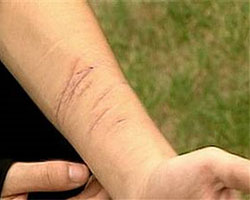 Implications for Learning
Implications for Learning
Compulsive behaviours come to the attention of instructors usually only when they begin to negatively impact students’ ability to adequately perform at the postsecondary level. While most people who experience compulsive behaviours are able to function very well in school and in life, compulsions can have a negative impact on students’ ability to participate in a learning experience. Due to ritualized or obsessive behaviours, students may experience sleeplessness or an inability to get to their schoolwork completed. If the condition includes disordered eating, students may experience physical complications, including symptoms of physical weakness and malnutrition. Students who experience obsessive perfectionism may have difficulty feeling that their assignments are “good enough” to turn in, and they may submit them late or not even turn them in at all.
A student who experiences the compulsion to engage in self-harm (e.g., cutting or scratching one’s arms or legs) can also be disruptive to the entire learning environment, as other students may respond with shock or fear at seeing the marks or scars. While it is important to avoid getting into power struggles around compulsive behaviours, appropriate steps may be needed to preserve a positive learning environment for all.
The following accommodations and classroom adaptations are a list of suggested accommodations, but are not comprehensive or exhaustive, nor will all accommodations listed be necessary in all cases. Other accommodations may be implemented based on the individual needs of each student as recommended by your campus Disability Services Office or other professionals.
| Common Characteristics of a Student with Compulsive behaviours | Commonly Suggested Accommodations/Classroom Adaptations |
|---|---|
| Inability to focus on schoolwork. Late or incomplete assignments. | As long as the student is actively seeking professional assistance for these behaviours, some flexibility in deadlines may be helpful. |
| Academic performance that is lower than it should be. | Possible provision of a tutor. |
| Chronic lack of sleep. | Referral to counselling or a medical professional. |
| Chronic lack of money despite having decent income/resources. | Referral to student services for help with budgeting. |
| Evidence of self-harm, possibly visible bandages, cuts, and scarring. | Possible referral to campus health clinic or medical professional. |